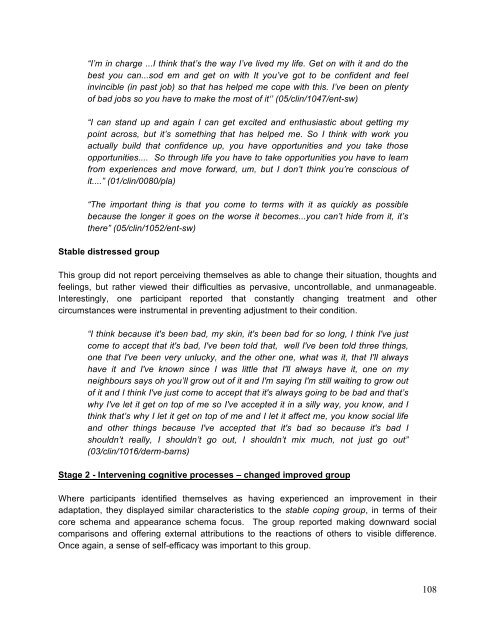Download the report - The Healing Foundation
Download the report - The Healing Foundation
Download the report - The Healing Foundation
Create successful ePaper yourself
Turn your PDF publications into a flip-book with our unique Google optimized e-Paper software.
“I’m in charge ...I think that’s <strong>the</strong> way I’ve lived my life. Get on with it and do <strong>the</strong><br />
best you can...sod em and get on with It you’ve got to be confident and feel<br />
invincible (in past job) so that has helped me cope with this. I’ve been on plenty<br />
of bad jobs so you have to make <strong>the</strong> most of it‘’ (05/clin/1047/ent-sw)<br />
“I can stand up and again I can get excited and enthusiastic about getting my<br />
point across, but it’s something that has helped me. So I think with work you<br />
actually build that confidence up, you have opportunities and you take those<br />
opportunities.... So through life you have to take opportunities you have to learn<br />
from experiences and move forward, um, but I don’t think you’re conscious of<br />
it....” (01/clin/0080/pla)<br />
“<strong>The</strong> important thing is that you come to terms with it as quickly as possible<br />
because <strong>the</strong> longer it goes on <strong>the</strong> worse it becomes...you can’t hide from it, it’s<br />
<strong>the</strong>re” (05/clin/1052/ent-sw)<br />
Stable distressed group<br />
This group did not <strong>report</strong> perceiving <strong>the</strong>mselves as able to change <strong>the</strong>ir situation, thoughts and<br />
feelings, but ra<strong>the</strong>r viewed <strong>the</strong>ir difficulties as pervasive, uncontrollable, and unmanageable.<br />
Interestingly, one participant <strong>report</strong>ed that constantly changing treatment and o<strong>the</strong>r<br />
circumstances were instrumental in preventing adjustment to <strong>the</strong>ir condition.<br />
“I think because it's been bad, my skin, it's been bad for so long, I think I've just<br />
come to accept that it's bad, I've been told that, well I've been told three things,<br />
one that I've been very unlucky, and <strong>the</strong> o<strong>the</strong>r one, what was it, that I'll always<br />
have it and I've known since I was little that I'll always have it, one on my<br />
neighbours says oh you’ll grow out of it and I'm saying I'm still waiting to grow out<br />
of it and I think I've just come to accept that it's always going to be bad and that’s<br />
why I've let it get on top of me so I've accepted it in a silly way, you know, and I<br />
think that’s why I let it get on top of me and I let it affect me, you know social life<br />
and o<strong>the</strong>r things because I've accepted that it's bad so because it's bad I<br />
shouldn’t really, I shouldn’t go out, I shouldn’t mix much, not just go out”<br />
(03/clin/1016/derm-barns)<br />
Stage 2 - Intervening cognitive processes – changed improved group<br />
Where participants identified <strong>the</strong>mselves as having experienced an improvement in <strong>the</strong>ir<br />
adaptation, <strong>the</strong>y displayed similar characteristics to <strong>the</strong> stable coping group, in terms of <strong>the</strong>ir<br />
core schema and appearance schema focus. <strong>The</strong> group <strong>report</strong>ed making downward social<br />
comparisons and offering external attributions to <strong>the</strong> reactions of o<strong>the</strong>rs to visible difference.<br />
Once again, a sense of self-efficacy was important to this group.<br />
108


